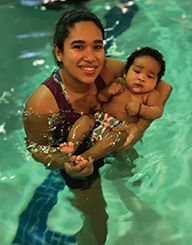By Alison Laurio
Stephanie Urbina, MSW, was enrolled in her first swimming class when she was a young child. Her parents had immigrated to the U.S. from Nicaragua and both worked full time.
“My mother wanted to bond with me, Urbina said, so she enrolled her 5-year-old daughter in competitive swimming. There, she said, “I really flourished.”
Why Swimming?
After high school, when Urbina was working on her bachelor’s degree, she stopped swimming for about four years as life got in the way. Then she said she “picked it back up as an adult.”
“The pandemic forced me to the pool and swimming,” Urbina said. “I needed to connect with myself, and I had time to heal the bits and pieces of my past narrative. Research does show it prevents depression.”
Urbina is an outpatient mental health therapist for the Children’s Bureau of Southern California in Valencia. When she became pregnant, she continued swimming.
“I always swam laps after work, and I wanted to include my child,” she said. “I wanted to feel the heartbeats and connect with them. It made me happy.”
Urbina compared it to hydrotherapy floating tanks, which are said to recreate a feeling of being in the womb. She said she felt like “no one can bother me.”
She now swims with her son, who started in the pool at 3 months old.
“As a young girl, I grew up learning discipline and how to behave,” Urbina said. “Swimming teaches you those values.”
Her son socializes with other babies, she said. They see each other and socialize by watching each other kicking and splashing the water and hugging each other. He has to concentrate and sit on the edge of the pool, and he knows I’m going to catch him, Urbina said of when her son was 13 months old.
“His mind is stimulated because of the swim, and he’s developing mindfulness,” she said. “It’s also good for his speech and fine motor skills.”
NASW members can read the full story in Social Work Advocates magazine.




